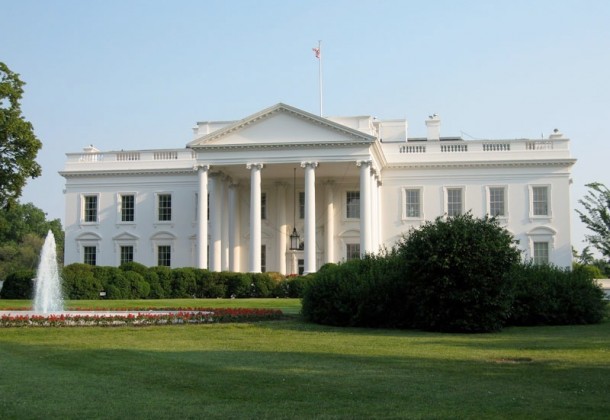White House Threatens Veto of Senate Defense Bill

Morning Coffee is a robust blend of links to news around the Internet concerning the Naval Air Station Patuxent River  economic community. The opinions expressed here do not reflect opinions of the Leader’s owners or staff.
economic community. The opinions expressed here do not reflect opinions of the Leader’s owners or staff.
The White House is threatening to veto the Senate version of an annual defense policy bill, The Hill reports. Despite adhering to a bipartisan budget agreement, the administration said the bill is objectionable in a number of ways, including imposing sweeping organizational changes on the Pentagon, keeping restrictions on closing the Guantanamo Bay detention facility, and capping the size of the National Security Council. In Tuesday’s veto threat of the Senate version, the administration commended the Senate for not “relying on budgetary gimmicks that risk the safety of our service members and undercut stable planning and efficient use of taxpayer dollars,” but the veto threat slammed other aspects of the bill.
Senior US officials pressed China again on Tuesday to reduce barriers for foreign businesses, saying concerns had grown as the regulatory environment became more complex, and they also bought up concerns over a new law on foreign non-governmental groups, Reuters reports. The request comes after a series of government investigations targeting foreign companies and China’s roll-out of a national security law limiting the use of overseas technology. US business groups also have complained about new Chinese regulations they say favor local firms and make it more difficult to operate in China.
The annual Pentagon report to Congress on China’s military reinforces earlier warnings about a concerted “counterspace” effort with electronic warfare and cyber operations that threatens US advantages,” Defense Systems reports. While much of the recent focus of China’s military strategy focuses on frictions in the South China Sea, the report submitted to Congress this spring highlights Beijing’s growing focus on countering US space assets.
Japan and the US threw open the door to arms sales between the two longtime allies, something Japan had long resisted. The deal was just the latest sign of how fear of a rising China is pushing Japan away from its post-World War II pacifism, Breaking Defense reports. DefSec Ash Carter and his Japanese counterpart Gen Nakatani quietly signed the Reciprocal Defense Procurement pact Friday.
The recent midair collision between two F/A-18F Super Hornets is the costliest mishap for the US Navy so far this decade. Combined with the fatal F/A-18C Hornet Blue Angels crash earlier this month, this puts the Navy on pace for its most expensive year for incidents, an Aviation Week analysis of US Navy Safety Center record shows.
The Canadian government wants to acquire the Super Hornet to fill its fighter-jet capability gap on an interim basis, which also would relieve pressure on country’s prime minister who said last year he would never buy an F-35, Defense News reports. But the F-35 is the jet still favored by Canada’s air force. Any decision to exclude the F-35 from a competition to acquire new jets could spark a messy legal battle.
Elon Musk, the CEO of SpaceX, will visit the Pentagon on Wednesday for a private meeting with DefSec Ash Carter, in a continuation of DoD’s outreach to the California-based tech community, Defense News reports. Pentagon press secretary Peter Cook said the visit will focus on “innovation” and that Mr. Carter wants to “hear directly” from Mr. Musk as part of his goal of bringing new ideas into the Pentagon.
A helicopter-drone attack formations of 20-foot drones working with Apache attack helicopters, is proving successful against the Islamic State, Defense One reports. However, challenges remain: The Hill sources the air campaign commander and reports a shortage of intelligence assets is slowing the air war against the Islamic State in Iraq and Syria. With most US forces far from the fight in the Middle Eastern region, commanders employ “deliberate targeting,” relying heavily on surveillance drones to develop targets before sending aircraft on bombing runs.
Syrian President Bashar al-Assad’s government intends to escalate military efforts to crush the 5-year-old uprising against his rule, saying the bloodshed will not end until he has regained control over all areas of Syria lost to the rebellion, The Washington Post reports. His tough words came amid indications that Russia is preparing to re-engage in the war in support of President Assad, almost three months after it threw its support behind a US-backed cease-fire and announced it was withdrawing most of its military from Syria.
The intelligence community is working on improving people-recognition power to spot, in live videos, shooters and potential terrorists before they have a chance to attack, NextGov reports. Current video surveillance techniques are not always precise in recognizing objects and people simultaneously, in real-time. But Deep Intermodal Video Analytics, or DIVA, a research project out of the Office of the Director of National Intelligence, will attempt to automatically detect suspicious activities, with the help of live video pouring in through multiple camera feeds.
Veterans are older and more diverse today than 15 years ago. And they are more dependent on health care and other VA benefits, according to a new study published in the June 2016 issue of Health Affairs Journal, summarized in Government Executive. Based on surveys of vets conducted in 2001 and in 2010, the study found vets in 2010 were twice as likely as vets in 2001 to have used VA health services; the 2010 group also were more likely to have applied for VA disability compensation and to have received higher ratings, despite being less likely to have served in a combat zone than those vets surveyed in 2001.





















